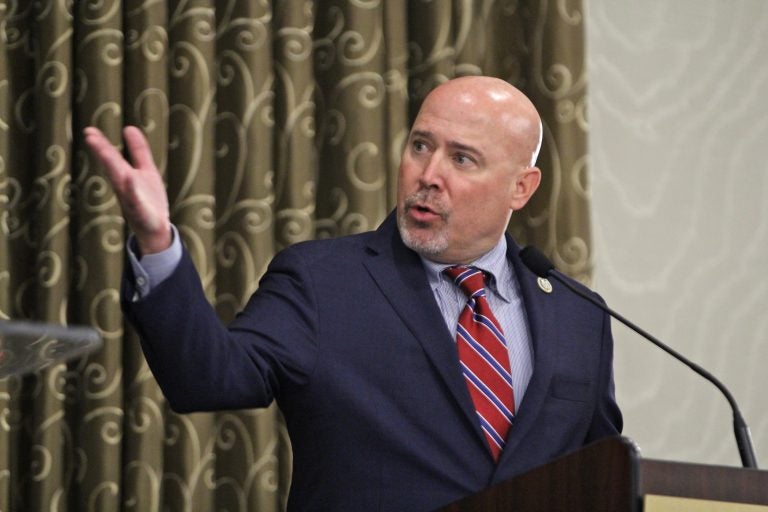MacArthur’s support for GOP tax plan could be issue for N.J. voters come Election Day
When the U.S. House of Representatives approved the Republican tax bill in December, only one New Jersey congressman voted yes.
Listen 5:49
U.S. Rep Tom MacArthur, a Republican, is running for re-election in New Jersey's 3rd District. (Emma Lee/WHYY)
When the U.S. House of Representatives approved the Republican tax bill in December, only one New Jersey congressman voted yes.
Now Republican Tom MacArthur is seeking re-election in a state that tax experts say is among the hardest hit by the GOP tax law.
Yet MacArthur has not shied away from his support for the plan.
“Look, I supported it very simply because I believe — and I’ve been proven right — that cutting taxes, leaving more money in families and businesses, is the best way to grow the economy,” he said in an October interview.
It’s still not clear how exactly the law signed by President Donald Trump will play out, but many Americans can expect to see a tax cut, since individual rates are going down. The corporate business tax rate is also the lowest it’s been in decades. MacArthur has touted both of those changes.
But Democrats in New Jersey — and even some Republicans — have bashed MacArthur for his stance on the tax overhaul.
His Democratic opponent, former national security official Andy Kim, has blasted MacArthur in TV ads, including one that proclaims, “Tom MacArthur was the only New Jersey member of Congress who voted to raise your taxes.”
SALT in the wound
Much of the criticism in New Jersey revolves around the law’s new $10,000 cap on state and local tax deductions, known as SALT.
Previously, a New Jersey homeowner could deduct state and local taxes from taxable income, and then pay federal levies on what remained.
Now taxpayers can only deduct up to $10,000, a change that’s irked Garden Staters who pay among the highest property taxes in the country.
MacArthur acknowledged that the law hits high-tax states hardest, but he has claimed that tax cuts and a much larger standards deduction would benefit more New Jerseyans than it would hurt.
“The tax bill is better for Pennsylvania than it is for New Jersey, because Pennsylvania has lower taxes than New Jersey,” MacArthur said. “But it’s still good for New Jersey families.”
That is not the case for Susan Lavine Coleman, who lives in the Philadelphia suburb of Moorestown, New Jersey, where the average property tax bill exceeds $11,000.
Coleman said her property tax bill is “far beyond” the $10,000 cap. And although her individual tax rate will drop this year, she said the new law will still cost her more. “This is, net net, very expensive.”
Coleman, a Democrat, voted for MacArthur in 2016 when he won his second term in Congress.
Over the last two years, though, she has soured on the incumbent. First, because he wrote a controversial amendment to the Republican bill that aimed to repeal the Affordable Care Act. Second, for his “yes” vote on the GOP tax plan.
Coleman has become more politically active since the 2016 election, canvassing for Democrats and setting up a website on MacArthur’s positions. She said she noticed a change in her neighbors, too.
“What I’m seeing is these people, who were generally Republicans although I’m assuming most of them were centrists, are just feeling like their congressman has flushed them down the toilet, is just not looking out for them anymore,” she said.
The nonpartisan Tax Policy Center estimated that about 10 percent of New Jerseyans will see their taxes go up as a result of the law, the most of any state.
That is in part due to the cap on SALT deductions, which some housing analysts say is also hurting property values.
Tax cuts
Yet scores of New Jerseyans will see lower tax bills this year, finding themselves in tax brackets with lower rates or being able to take advantage of increased deductions and tax credits.
More than half of 3rd District taxpayers take the standard deduction, which doubled under the new law, on their federal taxes. The child tax credit doubled, as well.
Republican leaders including MacArthur say the country is already feeling the positive effects of the tax cuts, pointing to booming job growth. They reference instances such as New Jersey-based Quest Diagnostics announcing it would give out bonuses to employees as a result of the tax changes.
All evidence, according to MacArthur, indicates he made the right decision.
“Look, I don’t relish being alone on any vote, but I didn’t go to Congress for other people to tell me how to vote,” he said during a debate on NJTV this week. “I vote my conscience, I spent my life in business, and when I look at these tax cuts, I see something that is going to grow our economy.”
A spokesman for Kim said he believes the country needs “tax reform that benefits middle-class families and restores state and local tax deductions,” adding that the Democrat would seek a “bipartisan” tax overhaul.
Whether voters in the 3rd District are thrilled or upset about the Republican tax law, it’s clear that they are at least thinking about it.
A recent Stockton University poll found that, among likely voters in the district, taxes were the No. 1 issue.
The same poll found that MacArthur and Kim, after months of attack ads and tense debates and political spending, were locked in a statistical tie.
WHYY is your source for fact-based, in-depth journalism and information. As a nonprofit organization, we rely on financial support from readers like you. Please give today.




